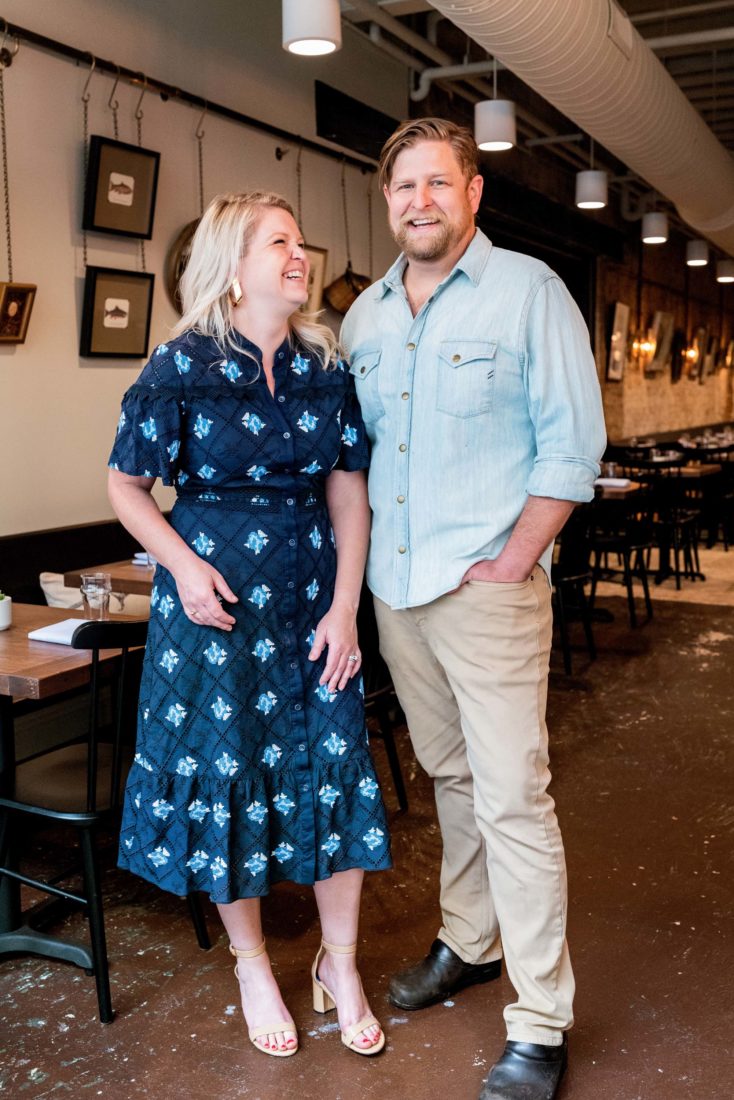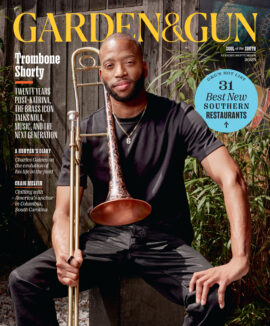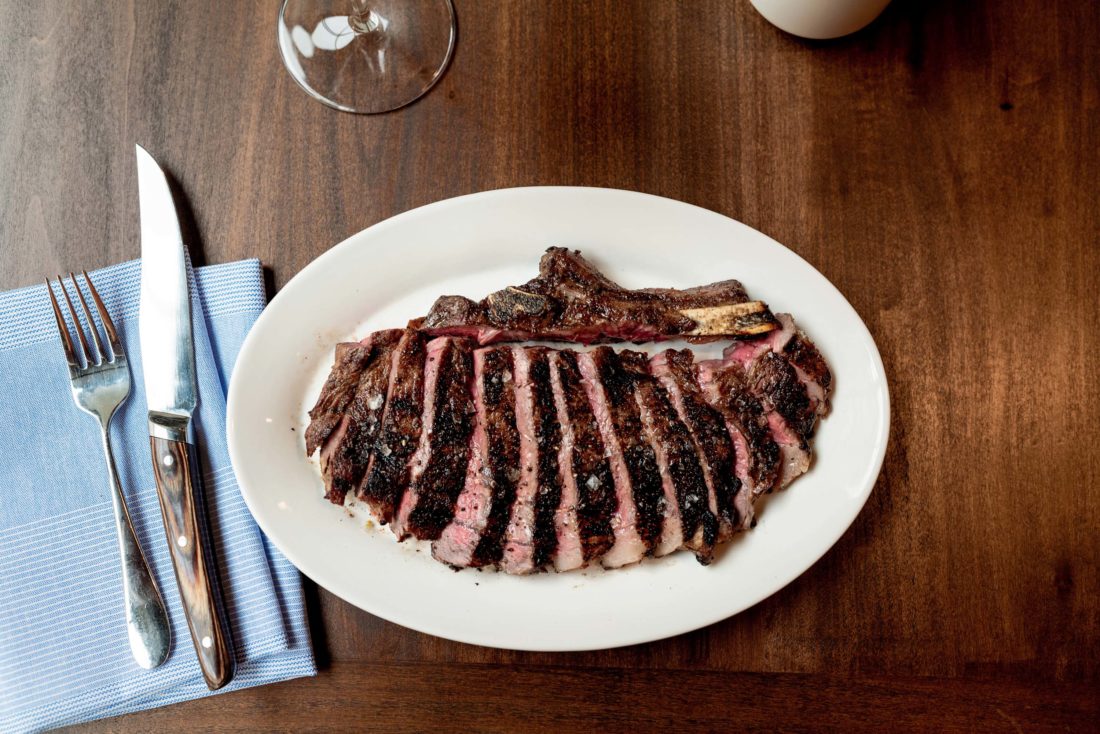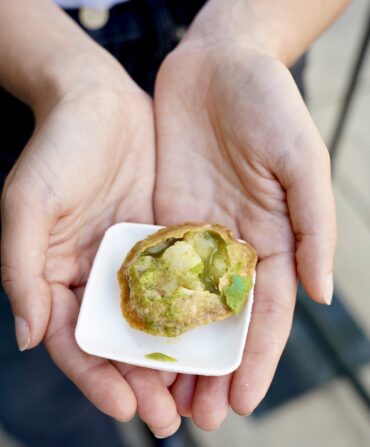Helen Frutiger cooked on a cast-iron grill, tucked into a brick wall in a brick ranch house with a backyard that sloped toward a creek. With a used French’s mustard bottle at her side, filled with water to knock down grease flames, she grilled the fatty rib eyes her husband, Jack, bought on orange-tag sale. Chef Rob McDaniel’s maternal grandmother, who passed in 2014, worked that grill in Oneonta, Alabama, a little northeast of Birmingham.
Get McDaniel talking about his grandmother and he speaks of family dinners that began with celery sticks and radishes and ranch. He sniffs the air for the Worcestershire sauce she used to marinate those rib eyes. And he talks of channeling those taste memories to develop Helen, the neo–steak house he and his wife, Emily, opened in late August in Birmingham.
The space is a storefront shotgun in the heart of downtown, in the shadow of a twenty-seven-story skyscraper. Decoupaged recipes for baked Brie and lemon bars and spinach dip, some written in Frutiger’s elegant cursive, line the entry hall. In a dining room set to look like a tavern, polished turtle shells hang alongside turkey feathers in shadow boxes. Instead of banquettes, church pews skirt the far wall. Bolsters, stitched with pheasant, render the Sunday hardwood comfortable for Saturday nights.
When I visited late this past summer, Rob worked the expo line, opposite a series of wood-stoked grills that leaped with flames, wearing a hat from Standard Deluxe, the screen print shop and concert venue on the way to Auburn, near Lake Martin. Cooking on the lake at the restaurant SpringHouse for a decade, he won a reputation as a skilled interpreter of Southern foodways. Together with Emily, who once sold real estate and now directs hospitality at Helen and manages cash flow, he has built a restaurant that answers the question admirers have long asked: After cooking for others, when will you open your own place?

At Helen, that experience paid off in a demure appetizer of smoked veal sweetbreads, pink at their cores, topped with roasted peppers, swaddled in Garnacha vinegar, and served on a tuffet of grits. My wife, Blair, ordered planks of yellowfin tuna, lightly cured and dressed with a burnt ginger vinaigrette. Coal-roasted eggplant tasted creamy and sweet, like fire-cooked caramel. The celery and blue cheese slaw, cut with matchstick potatoes, begged to be spooned atop an entree of anise-scented porchetta slices that looked like pork corsages.
A restaurant inspired by meat cookery bears a particular burden when it comes to steaks. McDaniel does right by his grandmother. Charred over a red oak fire, a prime rib eye arrived sliced and fanned across the platter, with the bone placed at top-center like the crest on a coat of arms. It tasted fatty and ferrous and decadent, which is to say it tasted like a labor of love that connected the Oneonta of his youth and Birmingham today.
As a new generation of Birmingham restaurateurs have gained momentum, they have relied on a talent pool developed over decades by Pardis and Frank Stitt of Highlands Bar & Grill and Idie and Chris Hastings of Hot and Hot Fish Club. That’s part of the reason why, even in its first month, service at Helen felt assured. Waiters spoke with enthusiasm and insight about thin-cut pork chops that tasted of charcoal and pepper relish, and an appetizer of angel biscuits, scattered with sea salt and smeared with cane syrup butter, that ate like the best dessert in the house.
Servers worked the room like advocates. On our first night, thirsty for a white wine that balanced depth and salinity, I was game to splurge on a trophy bottle, but general manager Daniel Goslin steered me toward a thirty-six-dollar Bordeaux Blanc Sec from Château Roc Meynard. Asked by Blair to suggest a dish, a waiter guided her to the least expensive entree on the menu, an eighteen-dollar roasted half chicken, garnished with tomato caponata, anchovies, olives, and a drizzle of cane syrup. Neither suggestion was born of frugality; the gauge was joy.
To run a restaurant where the staff advocates for patrons requires a lot of a restaurateur. I thought about that on our second night at Helen. Men with face masks strapped to their necks like ascots paced the sidewalk, studying the menu on their phones. Inside, women in very high heels queued to claim tables. When parties reached the host desk, a young man cheerfully greeted patrons and pointed a temperature gun at their foreheads.
By the time you read this, scientists may have come up with a better way to determine who is virus-free. But when it seemed an impossible goal to open a new restaurant, and a more impossible goal to win regulars, the McDaniels used that gun to signal that they were as serious about safety as they were about rib eyes.
Restaurants have long promised to lift our burdens for a couple of hours, to offer food that delights and service that coddles. Over the last decade, Americans have demanded more, asking questions like, Were your pigs raised humanely before they became pork chops? Recently, the questions have gotten tougher: Does the cook working the wood-fired grill earn a fair wage? As the pandemic took its toll, patrons began to ask even more of restaurateurs. A bunker in the storm of this moment, Helen showcases one hopeful future. Inspired by a woman who taught a boy to tame fire, born in the dense fog of a dark year, Emily and Rob McDaniel’s restaurant shines like a beacon.








